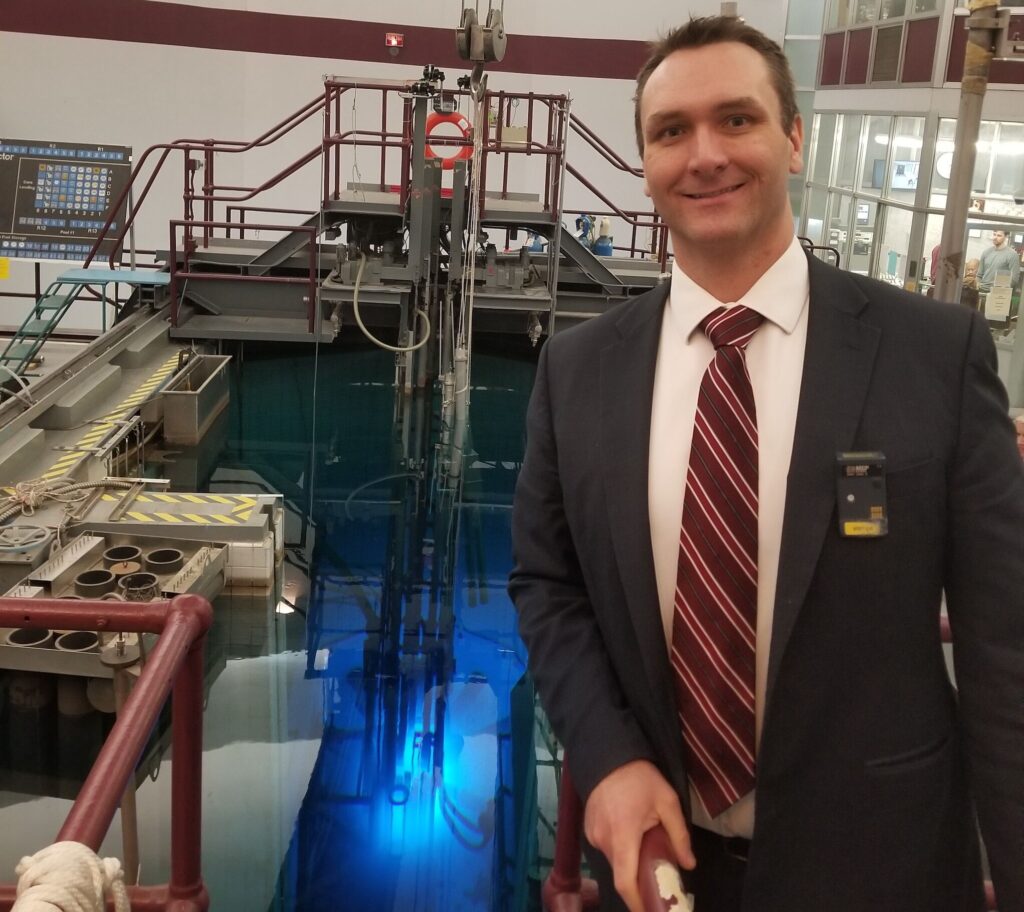
The department of Engineering Physics welcomed their newest faculty member, nuclear engineer Markus Piro, at the start of 2024. Piro, who is serving as an Associate Professor, brings with him many years of nuclear energy expertise in academia and industry.
An unexpected path to nuclear
Becoming a nuclear engineer wasn’t Markus Piro’s original plan.
Armed with degrees in mechanical engineering, Piro was initially interested in pursuing a career in the aerospace industry. But, as fate would have it, that wouldn’t be the case.
After his resumé landed in the hands of a friend’s mother who worked in national defense, Piro found himself studying nuclear engineering in a PhD program at the Royal Military College of Canada.
The sudden change in his studies laid the groundwork for what would become an impressive career in nuclear research.
After completing his PhD, Piro went on to do a post-doctoral fellowship at the Oak Ridge National Laboratory in Oak Ridge, Tennessee before finding his way back to Canada as the Section Head of Fuel Modelling and Fission Product Transport at the Canadian Nuclear Laboratories (CNL).
His four-year stint in this role wrapped when he joined Ontario Tech University, where he served as an Associate Professor, Canada Research Chair (Tier II) in Nuclear Fuels and Materials and founding Chair of the Energy and Nuclear Engineering Department.
And now, having joined McMaster Engineering, Piro says he’s looking forward to continuing his research and inspiring students to pursue nuclear education.
Research meets mentorship
A passion for research, Piro says, is what has both anchored and propelled him throughout his career.
With a focus on nuclear fuel chemistry, Piro’s research looks at fuel behaviour in nuclear reactors with the goal of enhancing fuel performance and maintaining safety in both conventional and emerging nuclear technologies, such as Small Modular Reactors (SMRs).
One of the benefits of conducting this research, Piro says, is the opportunity to mentor undergraduate and graduate students.
At CNL, which recently launched The CNL Nuclear Undergraduate Research Experience program in collaboration with McMaster University and Atomic Energy of Canada Limited (AECL), Piro was responsible for supervising co-op students, who did hands-on work in a lab while gaining valuable networking experiences. This experiential learning opportunity also played a key role in recruitment efforts, Piro explains, as many co-op students were hired on once they graduated.
The move to Ontario Tech provided Piro with even more mentorship and training opportunities. While there, he led a team of 20 student researchers with a focus on working collaboratively with industry partners.
At McMaster, Piro hopes to continue his role as a mentor and inspire his students to pursue a nuclear education.
“I am looking forward to playing a pivotal role in preparing Mac Eng students to be the next generation of leaders in nuclear engineering, making them ready for the real-world of working in this industry.”
Advancing nuclear research at McMaster
Piro brings a love of research and teaching to McMaster. And with access to state-of-the-art nuclear facilities on campus, the sky’s the limit for what he is hoping to achieve with his students.
“I am a proud Canadian nuclear engineer who loves research,” says Piro. “McMaster being Canada’s nuclear university; this is a natural place for me to be.”

With an increased emphasis on nuclear energy in Canada’s future, Piro says it is vital that McMaster actively works with the surrounding community to address misconceptions about nuclear energy.
One of the challenges of nuclear energy, explains Piro, is that people don’t typically see it in their everyday lives. If you look at different energy systems, like a coal plant or a natural gas plant, people can see those systems mirrored in their day-to-day lives and better understand them – for instance, a gas barbecue can act as a model of a natural gas plant. The same can be said for wind or solar energy, where people are able to see the tangible existence of this energy source every time they see a turbine or a solar panel.
That’s not the case with nuclear.
“You don’t have that level of familiarity and comfort with a nuclear reactor,” says Piro. “That’s part of the challenge connecting a very complex thing to regular people.” He believes these knowledge gaps can be addressed, however. And it all starts with highlighting the impact nuclear science has on millions of lives across the world each and every day.
“Our nuclear facilities at McMaster are one of the leading producers of medical isotopes that are used to diagnose and treat people with cancer. It’s a prime example of how nuclear positively impacts so many lives.”
But that’s not the only example of impact, explains Piro. He thinks the reactor is capable of even more.
“We will continue to leverage the nuclear reactor to conduct a wide range of research that will change the lives of individuals in communities who need it most, and I look forward to being a part of the team who will make this happen.”
